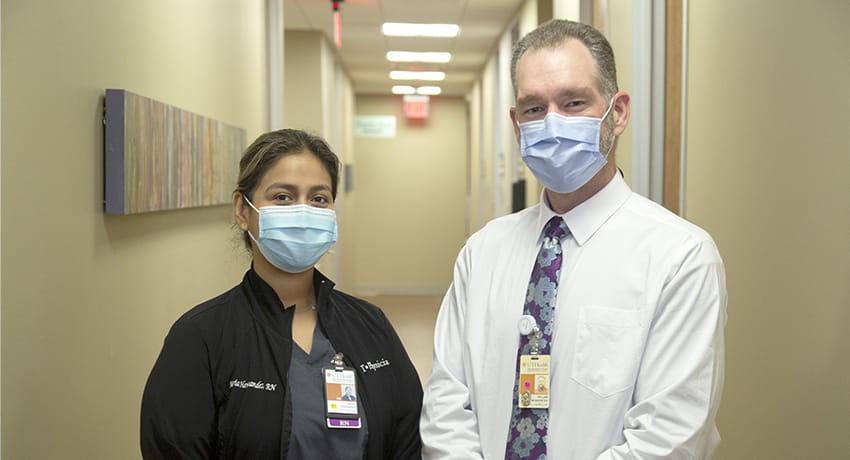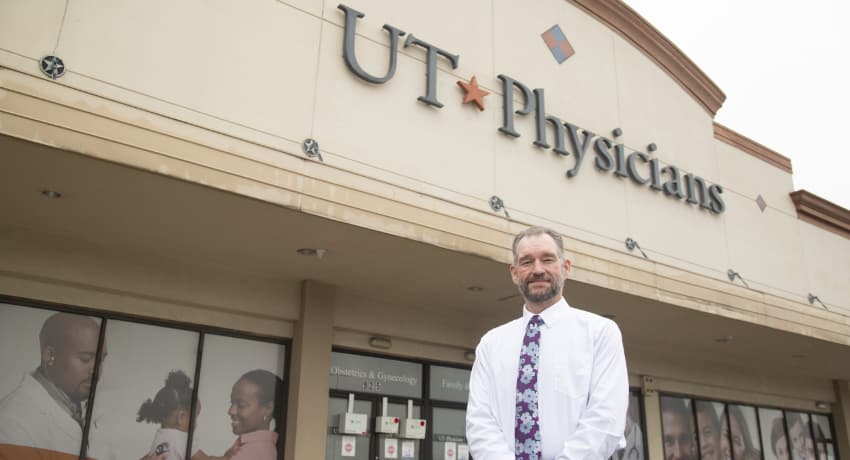For almost five years William “Will” McWhorter has worked alongside health care experts as the practice manager of the UT Physicians Multispecialty — The Heights clinic. One day, his close relationship to his co-workers paid off in a major and life-changing way.
Symptoms of a bigger issue
On a normal business day at the clinic, McWhorter began experiencing pain in his shoulder and shrugged it off as a possible injury. However, one person took his discomfort seriously, registered nurse Maria Hernandez.
“She saw me and knew something was wrong,” said McWhorter. “Maria pulled me into an exam room to check on my vitals, and it was obvious that my heart was under stress.”
With The Heights clinic being home to a multidisciplinary team of experts, McWhorter was able to see a cardiologist that day.
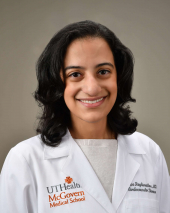
“Will seemed nonchalant about the symptoms he was experiencing and I strongly suggested that he let me formally test him for heart disease that same day,” said Deepa Raghunathan, MD, a cardiologist with UT Physicians and McGovern Medical School at UTHealth.
At 38, McWhorter was dealing with hypertension and diabetes in addition to his mysterious shoulder pain due to his weight. At 330 lbs. he was considered clinically obese and it was severely impacting his health.
After multiple tests, including an electrocardiogram, an echocardiogram, and an angiogram, and after consults from several specialists, the results showed McWhorter had over 60% blockage in one of the major arteries of his heart. The best treatment plan to prevent any further damage to his heart was surgery to place a stent that would allow proper blood flow.
“Will had his heart procedure and was discharged from the hospital the same day without any complications,” said Raghunathan. “This event was a wake-up call for Will. He knew he needed to lose weight to improve his cardiovascular health.”
Experts recognize obesity as a chronic condition that can result in heart disease, which is the leading cause of death in the U.S. according to the Centers for Disease Control and Prevention.
Knowing that long-term health depended on how seriously he took Raghunathan’s warning, McWhorter sought out the help of another UT Physicians specialist.
Weight loss surgery
Joining the medical team of experts to get his health back on track was Erik B. Wilson, MD, bariatric surgeon with UT Physicians.
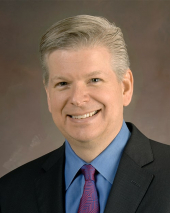
“Will’s situation is common to so many of my patients who develop organ issues due to the overall disease of morbid obesity, which adds so much risk to our health,” said Wilson, who is also a professor in the Department of Surgery at McGovern Medical School. “We were eager to help Will improve his abnormal metabolism and appetite with the decided upon weight loss procedure – gastric bypass.”
Gastric bypass surgery is a common weight loss surgery option. During this procedure, a small pouch is created from a patient’s stomach and then connected directly to the small intestine. This shrinks the size of the stomach, causing a feeling of fullness much quicker into a meal.
In February 2020, his surgery was put on hold as it was considered elective and the COVID-19 pandemic was becoming more prevalent. While waiting for his surgery to be rescheduled, McWhorter lost 50 lbs.
Finally, in September 2020 when elective procedures were allowed due to a drop in positive coronavirus cases, Wilson performed the procedure.
“I couldn’t put my health on hold because of the pandemic,” said McWhorter. “My biggest fear at the time of surgery wasn’t COVID-19 because of the safety protocols in place; it was that my family were unable to be with me.”
McWhorter was able to return home the day after his surgery. Recovery consisted of medication, a liquid/soft foods diet approved by a nutritionist, and walking to help with the healing process.
“Will put in the work to lose the weight and get healthier,” said Wilson. “However, now it was much easier for him to make those healthier decisions because his body’s metabolism was no longer working against him.”
New healthy lifestyle
Today, McWhorter has lost a total of 148 lbs. There has been many other positive changes in his life as well.
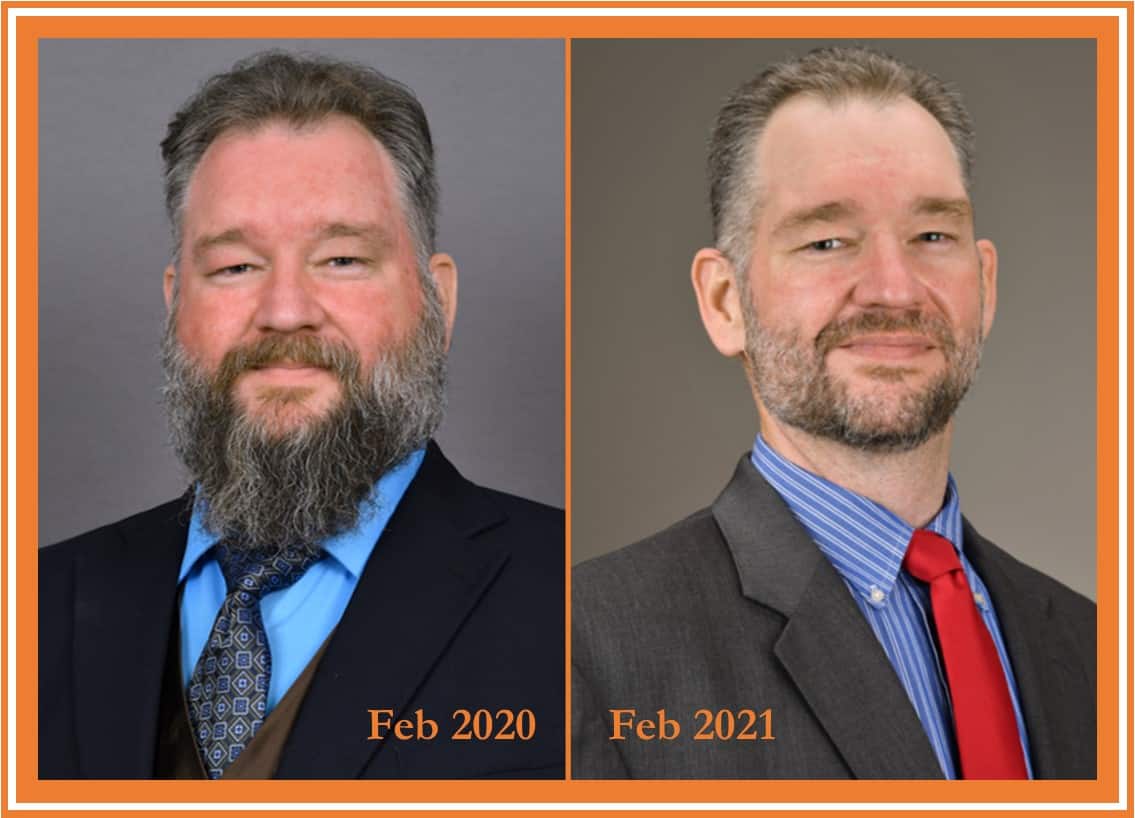
“I’m more active in my community, I’ve been volunteering during the pandemic, completing a few woodworking projects, and my honey-do list is staying done,” he said. “We got a dog and I discovered a love for hiking.”
His overall health has drastically improved — no longer needing blood pressure medication, diabetes diagnosis gone, and no problems with his breathing. Mentally, McWhorter also feels like his mind is sharper, likening it to a fog being lifted from his brain.
For those considering weight loss surgery, he highly suggests it – but warns it is not an easy way out.
“You have to put in the work. I have tried every kind of diet and program out there, and none were sustainable,” said McWhorter. “Don’t feel diminished if you pursue weight loss surgery. It’s a genuine change for your health.”
When asked about his story and journey, he can’t help but to think back to that day in the office with his co-worker, Maria Hernandez.
“Without Maria asking me the simple question of ‘Will, are you all right?’ I would be dead today,” he said. “I can’t thank her enough.”
